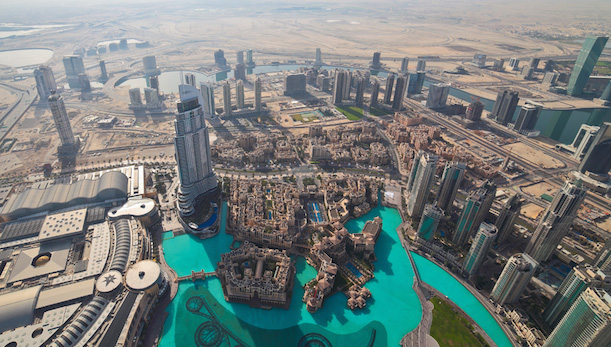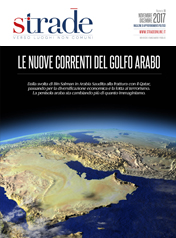United Arab Emirates, a 2017 of growth
Novembre/Dicembre 2017 / Monografica
From technology to its geopolitical role, from economic to financial performance, 2017 tells the story of a country experiencing growth while at the same time becoming increasingly less dependent on fluctuating oil prices.

In a region that has been witnessing conflicts, civil wars, and shifting alliances, the UAE continues to play a prominent role in maintaining regional security through utilizing a proactive approach of addressing rising security threats. The Emirati regional strategy aims to ensure stability and counter terrorist organizations in Yemen, the horn of Africa, and Libya. Accordingly, the UAE has cooperated with other Arab countries, especially Saudi Arabia and Egypt, as well as super powers including the US.
This is evident in its military operations in Southern Yemen against al-Qaeda in the Arabian Peninsula (AQAP), and in the efforts directed to secure the Bab al-Mandeb strait. Furthermore, the UAE conducted a deal with the Somaliland government to establish a military base in the port of Berbera. The deal will allow a naval presence in Berbera's port and an air force presence at its airport. The UAE may utilize the base to support its ongoing military operations in Yemen, as well as to protect its shipping interests from maritime threats, including piracy, in the Red Sea and the Gulf of Aden.
In exchange, Somaliland will be provided with "much-needed training and equipment for its forces" [1]. The deal further extends to supporting the Somali central security forces in their fight against the al-Shabaab terrorist organization which is affiliated with al-Qaeda. The UAE has also financed the establishment of a maritime police force in Puntland, along with providing the forces with training and equipment [2]. There have been unverified reports that Egypt may also be given access to the UAE's military facilities in Berbera, reflecting the continued coordination and cooperation between both countries extending to Libya [3].
Such coordination reveals that the UAE's precision to counter security threats does not focus on its neighboring countries, but instead also extends to supporting the Libyan National army (LNA) led by Khalifa Haftar in collaboration with the Egyptian government. This support has proved crucial in shoring up the LNA's forces against the Turkish and Qatar backed Islamist militant groups affiliated with al-Qaeda.
The Emirati role is, however, not only inclined to fight extremists, but also attempts to resolve the lingering conflict with Tripoli’s government. Accordingly, the Emirati government has hosted talks between Haftar and Fayez al-Serraj, the leader of the UN-backed Government of National Accord (GNA), in May 2017 with an eye to reach a deal to end the divisions between the two governments [4].
Technological Developments
The UAE has always been keen on being the world's hub for technology. In addition to its remarkable achievements throughout the past years, the UAE launched three prominent initiatives in 2017.
First, in April 2017, the UAE launched its National Space Programme, which aims to prepare youth Emirati cadres of astronauts. "Launching the National Space Programme is part of the UAE's ambitious space programme of reaching Mars by 2021 and building the first settlement there by 2117" [5]. The programme further entails the Arab Space Discovery Programme and an annual forum for scientists specialized space sciences [6].
Second, the UAE government launched the UAE Strategy for the Fourth Industrial Revolution (4IR) [7]. The strategy outlines a detailed plan to provide intelligent and interactive government services in a number of fields including enhancing the learning experience of innovative education, introducing genomic medicine and robotic healthcare, using bioengineering to sustain water and food supplies, adopting digital economy and blockchain technologies, as well as optimizing the utilization of satellite data in planning future cities [8].
Third, the "UAE Strategy for Artificial Intelligence" was launched in October 2017, as a part of UAE Centennial 2070 objectives. The strategy aims to develop new artificial intelligence tools to help the government "cope with rapid changes and achieve unique developments in general performance in all levels via integrated smart digital system" [9] In this regard, the Vice President and Prime Minister of the UAE, Sheikh Mohammed bin Rashid al-Maktoum, announced the appointment of Omar al-Olama, the Deputy Director of the Future Department, the world's first Minister of State for Artificial Intelligence who will ensure coherent and efficient implementation of the strategy [10].
Economic performance
The UAE has made significant progress in terms of its economic performance, diversification and global rankings as a leading economy in the Middle East and beyond. The World Economic Forum in fact ranked the UAE 17th on its Global Competitiveness Index 2017-2018, and stated that “This improvement shows the resilience of the UAE economy, in part due to increased diversification, which is reflected in its strengthening macroeconomic environment and its ability to weather the double shock of lower oil and gas prices and reduced global trade” [11]. The UAE economic ranking in the World Bank’s Ease of Doing Business 2018 report is yet another indication to its growing global status, resilience and strength. According to the report, the UAE economy is ranked 21st globally and has been a top Arab country for five years in a row, surpassing both France and The Netherlands [12].
The impact of the low oil prices and OPEC’s decision to extend oil production cuts has indeed affected growth in the oil sector and real GDP in the UAE with the oil sector expected to contract year-on-year from an estimated 3.4% to 2.0% according to Emirates NBD. Nonetheless, non-oil growth accelerated in 2016 by 2.7% as indicated by the UAE Federal Competitiveness and Statistics Authority in addition to positive indications for the same sector in 2017. According to Emirates NBD and PMI survey data, “non-oil growth in the UAE appears to have accelerated in H1 2017” [13] and “the PMI survey data in Q3 2017 points to the fastest rate of expansion in the non-oil economy in two years at 56.1” [14].
With Fiscal deficits in most GCC countries remaining substantial except for the UAE and the implementation of fiscal consolidation programs, along with the successful international bond issuances in the UAE in 2017, the UAE economy is becoming increasingly resilient [16].
2018 represents a very important milestone for the UAE economy. First, the International Monetary Fund expects the recovery in oil exports, specifically in Abu Dhabi, to accordingly help the UAE economy in terms of its GDP, anticipated to nearly triple in growth from 1.3% in 2017 to 3.4% in 2018 [16]. Secondly, Sultan Bin Saeed al Mansoori, the UAE’s Minister of Economy has recently announced that there are new laws that will further liberalize the UAE investment’s environment in which a new law “exempts foreign firms from giving local partners 51% of companies set up in the UAE is set to come into force next year” [17]. Thirdly, the introduction of VAT in January 2018 along with the prospects of a production growth strategy by OPEC in 2018 will also bring about positive outlooks for the UAE economy.
[1] Somaliland agrees to UAE military base in Berbera, BBC, February 13, 2017
[2] UAE's expanding regional engagement against jihadists makes its commercial assets abroad a likely soft terrorist target, Jane's Intelligence Weekly, January 26, 2017.
[3] Jeremy Binnie, Somaliland parliament approves UAE military base, Jane's Defence Weekly, February 2017.
[4] Jared Malsin, U.S.-Made Airplanes Deployed in Libya's Civil War, in Defiance of U.N., Time, May 9, 2017
[5] “National Space Programme", The Official Portal of the UAE Government, April, 2017
[6] “Mohammed Bin Rashid and Abu Dhabi Crown Prince Launch National Space Program.” WAM, April 12, 2017
[7] “UAE Strategy for the Fourth Industrial Revolution", the Official Portal of the UAE Government, September 2017
[8] Moran Chris, "UAE launches Strategy for Fourth Industrial Revolution, WAM, September 27, 2017
[9] WAM. “Mohammad Bin Rashid Launches UAE Artificial Intelligence Strategy.” GulfNews, October 17, 2017, accessible at: gulfnews.com/news/uae/government/mohammad-bin-rashid-launches-uae-artificial-intelligence-strategy-1.2106998.
[10] Jarallah, Juman. “Sheikh Mohammed Bin Rashid Announces UAE Cabinet Reshuffle.” The National, The National, October 19, 2017, accessible at: www.thenational.ae/uae/sheikh-mohammed-bin-rashid-announces-uae-cabinet-reshuffle-1.668631
[11] “The Global Competitiveness Report 2017-2018”. World Economic Forum. P 298.
[12] “Doing Business 2018: Reforming to Create Jobs”. The World Bank, October 31, 2017
[13] “GCC Quarterly: Q3 2017”. Emirates NBD, July 12, 2017
[14] “GCC Quarterly: Q4 2017”. Emirates NBD, October 26, 2017
[15] Global Economic Prospects: A Fragile Recovery June 2017”. The World Bank, June 2017
[16] Fattah, Zainab. “IMF expects U.A.E. Economy to Rebound in 2018 as Abu Dhabi Grows”. Bloomberg, October 31, 2017
[17] Kedem, Shoshana. “UAE Plans New Law to relax Foreign Investment Rules”. Arabian Business, October 30, 2017
INDICE Novembre/dicembre 2017
Editoriale
Monografica
- Golfo Arabo, l’anno che non c’era: cosa, come e perché della crisi del Qatar
- Arabia Saudita, primi importanti passi verso il cambiamento
- Generare forza attraverso l’unità: l’esempio del Bahrein
- Separare la politica dalla religione: un anno di riforme in Bahrein
- Emirati Arabi Uniti, un 2017 in crescita
- Kuwait e Oman, i mediatori del Golfo
- Gulf Economic Visions: come riprogettare l’economia del Golfo
- Arab Gulf, the year that wasn’t: the who, what and why of the Qatar crisis
- Saudi Arabia, the first important step towards change
- Generating strength through unity: the example of Bahrain
- Separating politics from religion: a year of reforms in Bahrain
- United Arab Emirates, a 2017 of growth
- Kuwait and Oman, mediators of the Gulf
- Gulf Economic Visions: how to redesign the Arab Gulf economy









